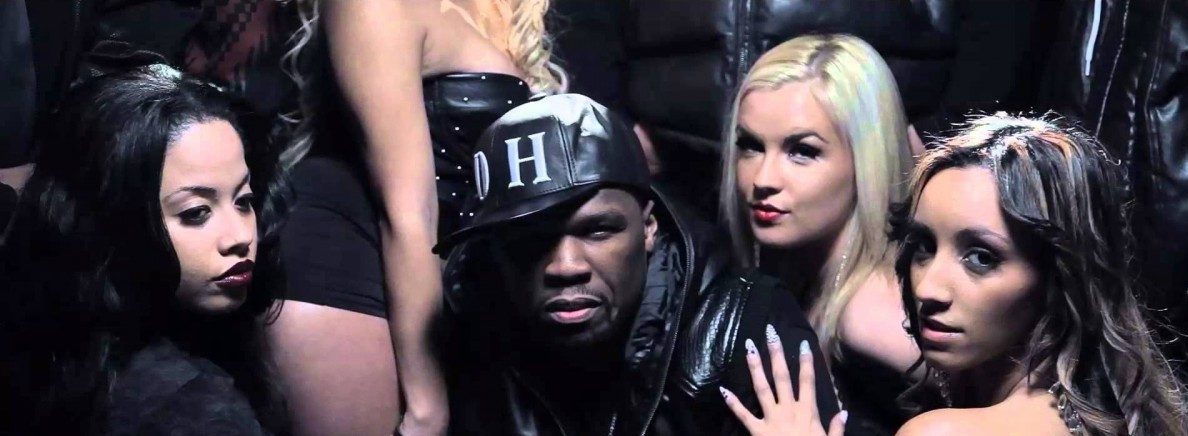By: John Jackson
Nick Minaj has become one of the most influential female rappers of the 21st century. Her unapologetic lyrics offer us insight into the world of hip-hop feminism. Which is defined as “a cultural, intellectual, and political movement grounded in the situated knowledge of women of color (who)… challenge, resist, and mobilize collectives to dismantle systems of exploitation” (Durham et al., pg. 721). Durham argues that Hip-hop feminism is considered a percussive form of feminism in that it is both disruptive and generative. Nicki Minaj’s songs and lyrics emulate hip-hop feminism as it functions in this percussive fashion. Furthermore, there is a tangible clash between respectability politics and hip-hop feminism. Politics of respectability have been used by African American Women as a way to progress in the face of oppression by appealing to systems of power that are in place, i.e. “white capitalist heteropatriarchy”. In this system, a false narrative has been created in which “black and brown bodies have been historically configured as excessive, with unrestrained desires” (Durham et al. pg. 725). Thus, Hip-Hop feminism aims to reclaim Black women’s sexual agency. Although the logic behind reclamation of agency is sound, there is still considerable backlash from respectability politics. Which begs the question, when is female rap subversive in nature and beneficial and when is it detrimental? Nicki Minaj’s popular songs and music videos, Anaconda, Only, and Feeling Myself offer insights into the complexity of this question. By critically analyzing these songs and videos through the lens of hip-hop feminism we can see that elements of her music are empowering while others are detrimental and insensitive.
#1 Anaconda, 2014
Lyrics: Anaconda
Music Video: Anaconda
Analysis:
Nicki Minaj’s song Anaconda (2014), has two verses that tell brief tales of her having sex with two guys, Troy and Micheal, in her automobile. She raps about Micheal’s large penis using the metaphor of an Anaconda. However, the focus of the overall song seems to be about large butts as she talks about her own curvy body figure in comparison to “boney” smaller females. This song points to the black reclamation of sexual agency and desire found in hip-hop feminism. Nicki is embracing her body figure in a percussive way as she challenges the American beauty ideal of the extremely thin female. Instead, she unapologetically states, “Fuck you if you skinny bitches” towards the end of the song.
The music video sets up a jungle style theme in which Nicki is shown twerking several times. Other sexual images are used such a white coconut milk (eliciting seaman) and phallic bananas. Yet, here again, the focus is placed on large butts and the sexual appeal that goes along with them. Overall, the song by itself can be seen as extremely powerful for women with curvy body figures that stray from beauty norms. In this way, Nicki and women with similar body images reclaim their sexual agency. However, the song and video especially, undoubtedly challenge respectability politics, as the content is extremely explicit (not something you would want kids watching at a young age). I believe that was Nicki’s intention as this song clearly has elements of hip-hop feminism.
Explicit Lyrics:
- Fuck the skinny bitches! Fuck the skinny bitches in the club!
- My anaconda don’t want none unless you got buns, hun
- Come through and fuck him in my automobile
Let him eat it with his grills, and he telling me to chill - I let him hit it cause he hang, hang, hang
Sexual Imagery:

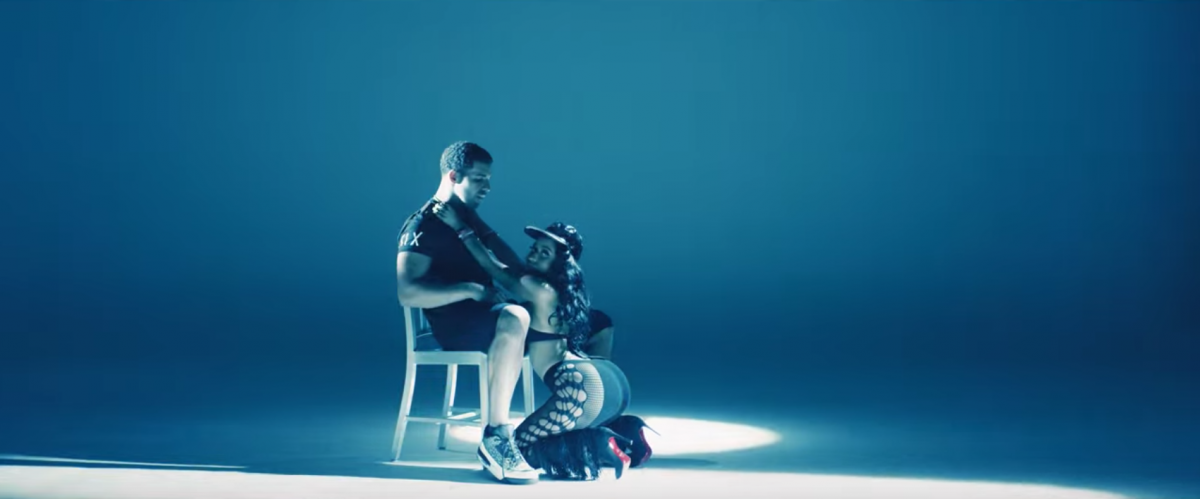
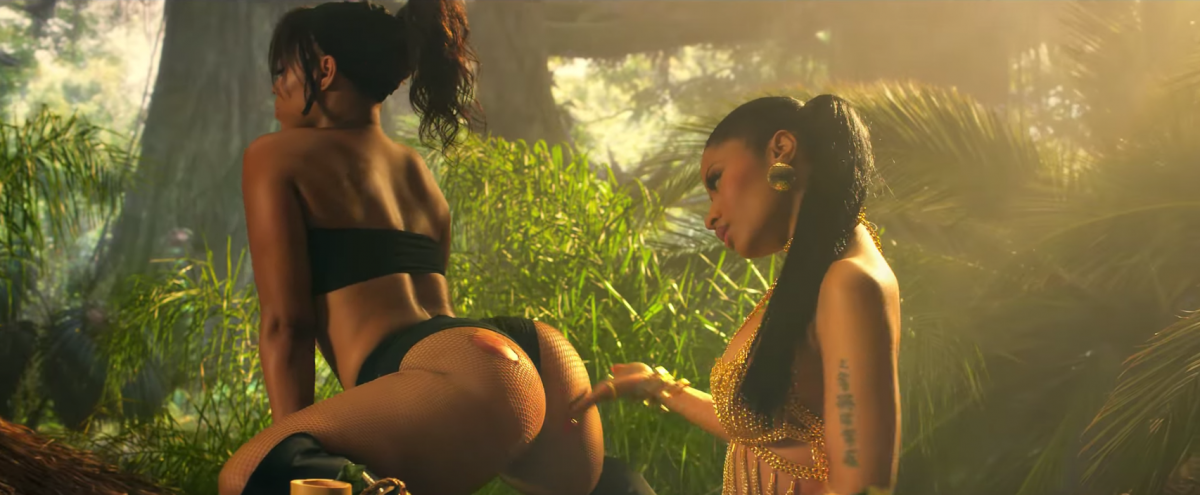
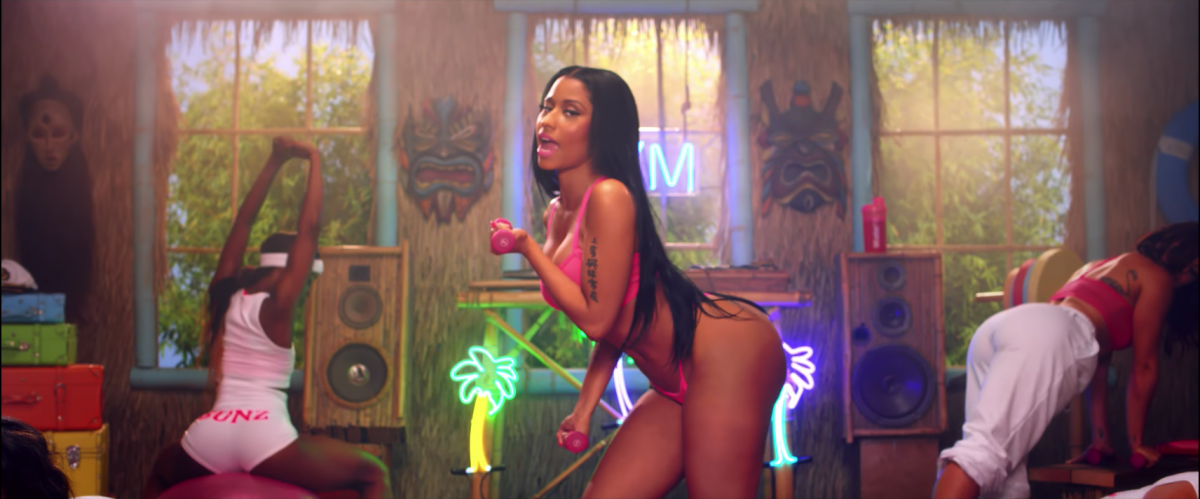
#2 Only, 2014
Lyrics: Only
Music Video: Only
Analysis:
Nicki Minaj’s song Only features male rappers, Drake, Lil Wayne, and Chris Brown. She begins the song by talking about having a threeway with Drake and Wayne. However, she notes that she has another man. Again, she emphasizes her curvy body figure, as the chorus states “thick bitches only”. Not only does she focus on her body image but Drake and Lil Wayne focus on it as well. Drake’s verse is almost exclusively focused on the sexual appeal of women with curvy body figures, “BBW”. Since it is Nicki’s song, she is essentially sexually objectifying her own image, claiming her sex appeal and empowering herself. Thus, she is trying to subvert gender role stereotypes in this way. I am not sure if the song by itself succeeds in fulfilling Nicki’s subversive aims. However, the music video more accurately displays the way in which Nicki is reversing gender roles.
The music video blatantly flips gender roles and norms by having Nicki and her friends enslave males to be used for sexual needs and desires. In this way, one could argue that she is reclaiming her sexual agency and disrupting gender norms. Yet, the women in the music video are still portrayed in an objectifying manner as they are wearing sexual outfits. Although explicit, the music video works to both disrupt gender roles and claim sexual agency, putting it in the realm of Hip-Hop Feminism.
Explicit Lyrics:
- Yo, I never fucked Wayne, I never fucked Drake
- Hut one, hut two, big titties, big butt tooHut one, hut two, big titties, big butt too
- She was sitting down on that big butt
But I was still staring at the titties though – Drake - That’s right I like my girls BBW, yeah – Drake
- My girl from a Bida if she wave
Baby and I fucked with her surfboard, surfboard – Lil Wayne
Sexual Imagery:
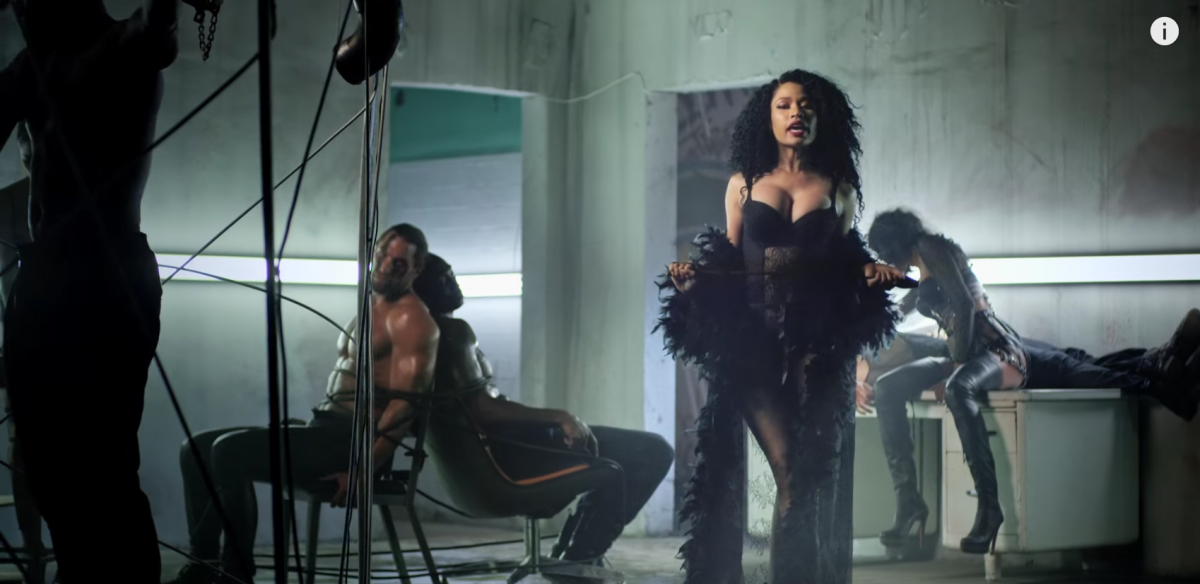
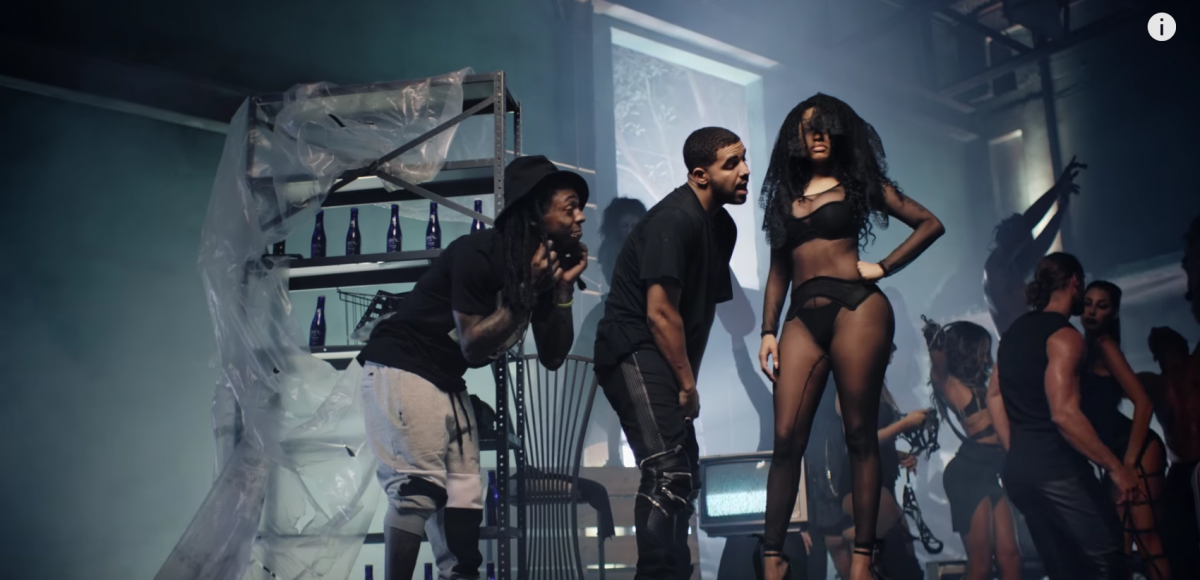

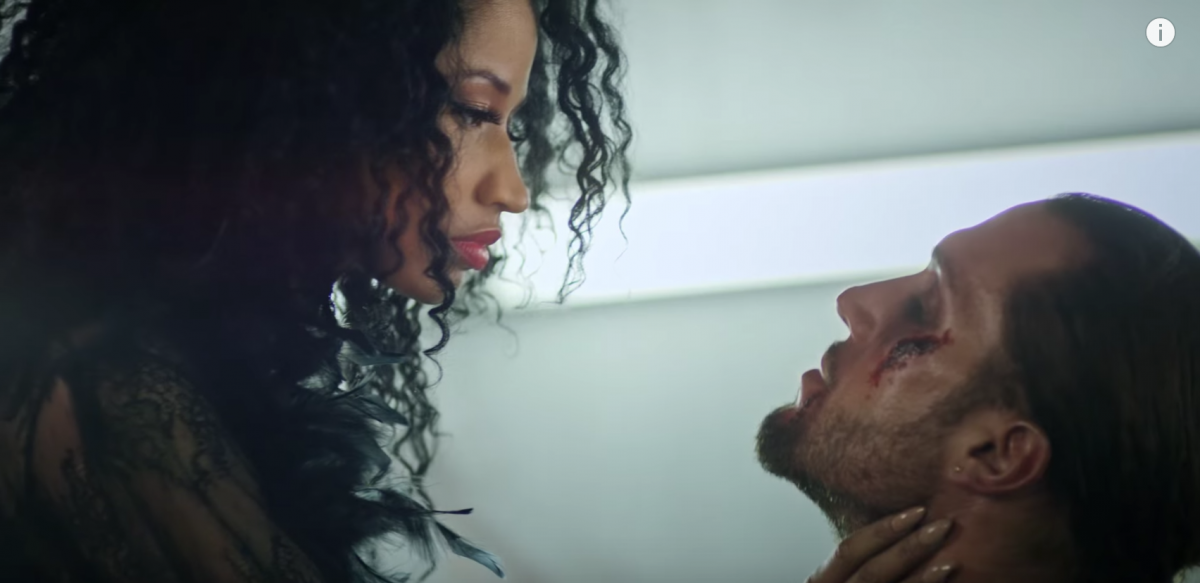
#3 Super Bass, 2010
Lyrics: Super Bass
Music Video: Super Bass
Analysis:
In Nicki Minaj’s song Super Bass, she describes two types of guys that she is interested in meeting at the club. The first guy she details owns a car with loud ass speakers, smokes weed, sells drugs, and isn’t too cocky. The second guy she details is essentially a business man who isn’t afraid to cut loose. Yet, she prefers to keep the second guy on the “Dolo” (down low) as she either doesn’t want to be associated with that type of guy or she finds excitement in secrecy. This song also suggests that Nicki is presenting her free sexual agency by describing two very different characters that she is interested in and can choose between. Within the lyrics themselves, there isn’t much description of the males physical bodies or penises, which we see in other Minaj songs. Thus, this song by itself doesn’t necessarily objectify men in the same way Only does.
However, in the music video, Nicki surrounds herself with half-naked male models. Again, the music video flips gender norms in rape culture on its head. Often male rappers will have many female models in their music videos dressed in skimpy outfits dancing by the pool. Well, Nicki recreates this familiar scene in a new light. I think this music video especially points to hip-hop feminism’s percussive nature as it challenges the status quo and definitely respectability politics. Again, this isn’t a video or song you would want a kid watching or hearing, however, I feel that it is more positive than negative in its impact.
Explicit Lyrics:
- When he make it drip, drip kiss him on the lip, lip (think about it, pretty graphic)
- He ain’t even gotta try to put the mack on
He just gotta give me that look, when he give me that look
Then the panties comin’ off, off, uh - Somebody please tell em who the eff I is
I am Nicki Minaj, I mack them dudes up (she’s in control) - Boy you got my heartbeat running away
Beating like a drum and it’s coming your way (Elements of love in chorus)
Sexually Imagery:
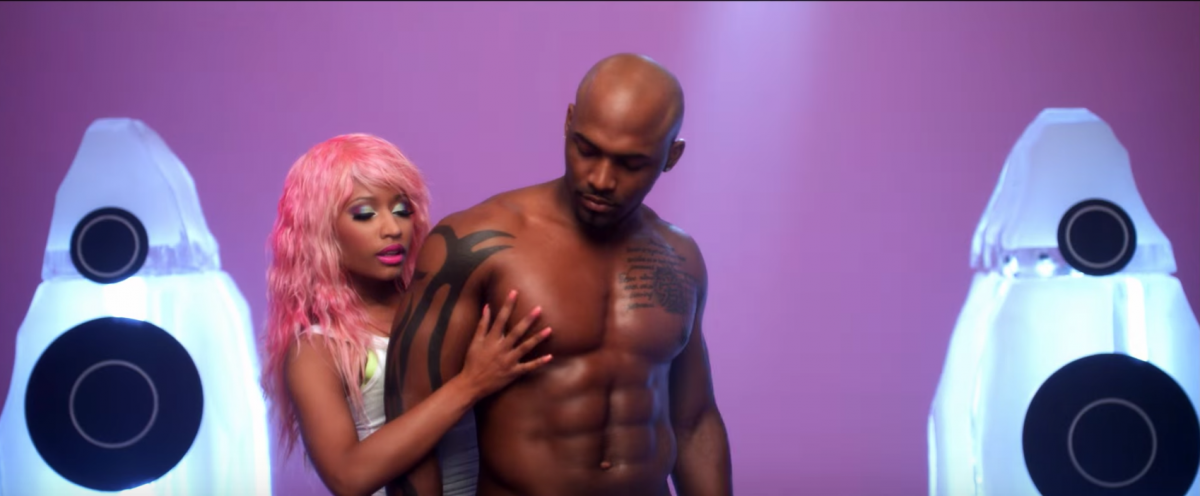
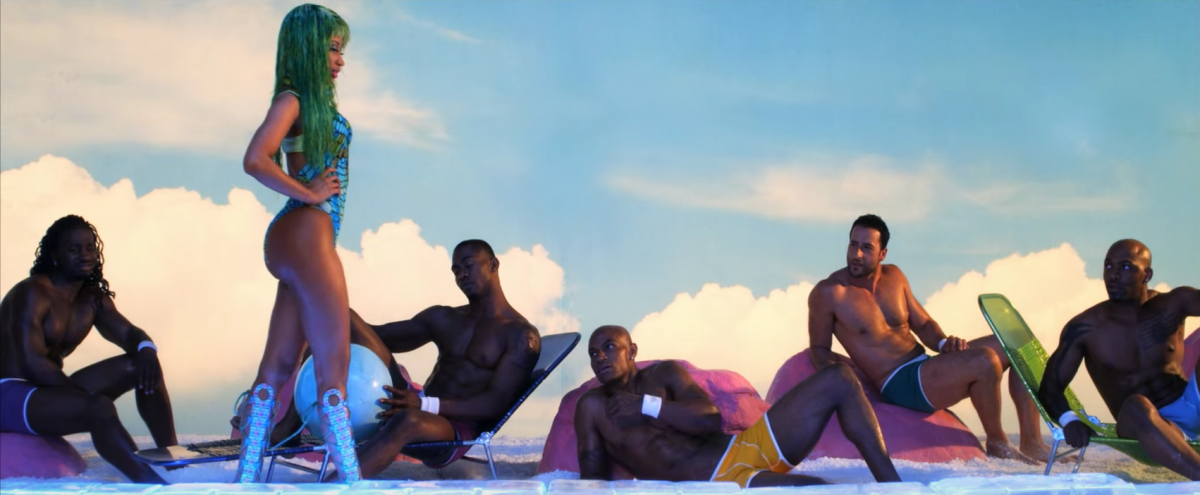

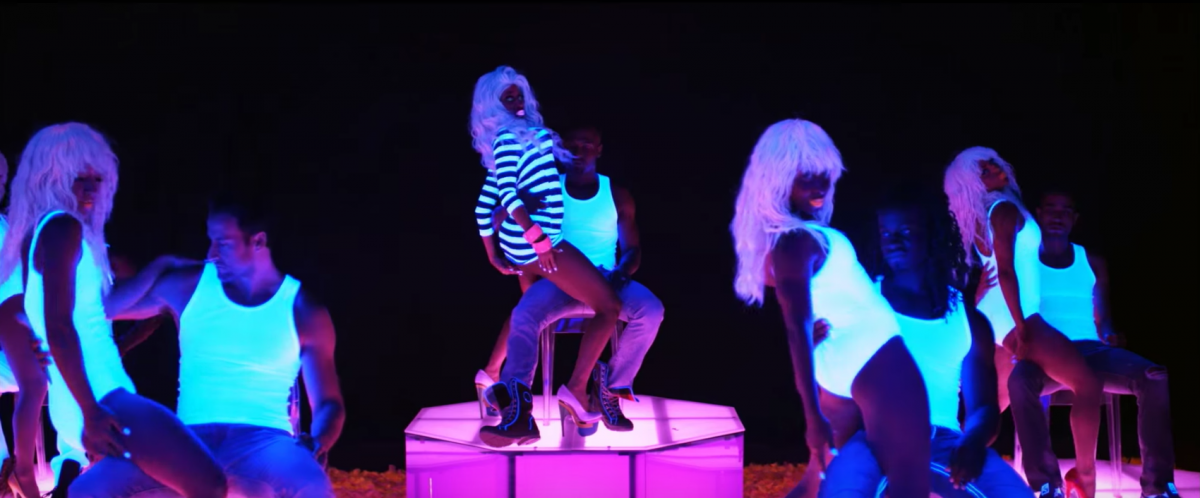
Concluding Remarks
After closely analyzing listening to and viewing Nicki Minaj’s music videos, Anaconda, Only, and Super Bass, it is clear that she is subverting common rap gender norms by embracing her sexual agency and flipping gender roles. Furthermore, specifically in Anaconda, she is challenging common American beauty standards of thin women by emphasizing curvy body images.
Works Cited
Durham, Aisha, Brittney C. Cooper, and Susana M. Morris. “The stage hip-hop feminism built: A new directions essay.” Signs: Journal of Women in Culture and Society 38.3 (2013): 721-737.
